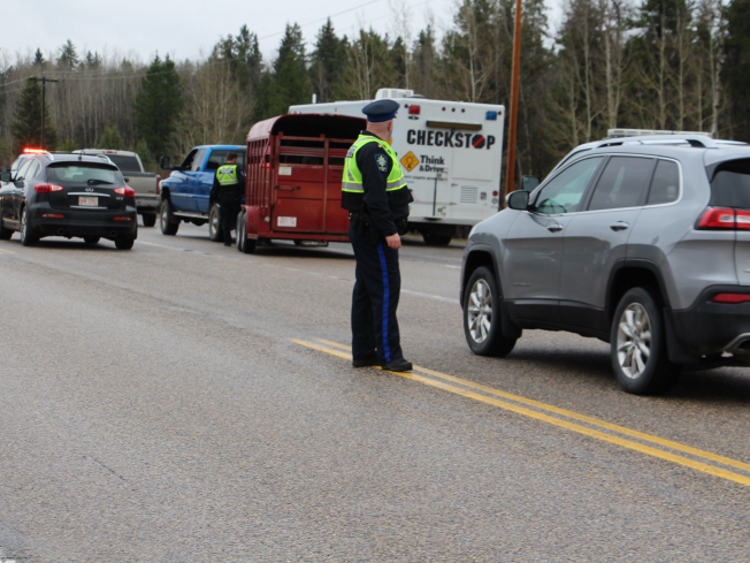Yesterday, May 16th, media was invited to a check stop operation occurring in the Cochrane area for an up close and personal look at Mandatory Alcohol Screening (MAS) which came into effect last December.
Sergeant Darrin Turnbull of Alberta RCMP Traffic Services, says May long weekend is always busy for members as it kicks off camping and the outdoor recreation season. With four fatalities during May long 2018, Sgt. Turnbull is hoping by being proactive, that the number of alcohol or drug related collisions is reduced or eliminated altogether. "We are here, it is the start of May long weekend on Thursday evening and we are getting an early start to try and keep people safe. We have been doing Mandatory Alcohol Screening since December of last year when it came into effect. Mandatory Alcohol Screening is anytime you are stopped in a lawful traffic stop by a police officer who has the training. and the screening device with them for alcohol, they can demand a sample."
Personally, Sgt. Turnbull has only experienced six cases where if mandatory screening did not exist, a breath sample would likely have not been taken. "There were no signs of impairment really jumping out at me and some of those were in the morning. People have to realize that alcohol takes time to get out of the body, so you have to give yourself enough time to eliminate the alcohol."

When it comes to mandatory alcohol screening, there are some public misconceptions out there, shares Sgt. Turnbull, when it comes to where the test can be performed. "We have situations where you are going to be lawfully stopped; whether that is a lawful check stop like this or just stopped for speeding, at that point in time is when an officer can request that test sample."
As far as detecting THC, the handheld unit used at last night's stop does not detect levels of THC but the majority of RCMP officers are trained on how to conduct standardized field sobriety testing. "Those are the tests where you have to stand on one leg and touch your nose, they are trained on that to detect drug-impaired drivers; whether that is cannabis, prescription, or any other kind of drug, But we also have with us today our drug recognition experts who are specifically trained on the 12 step process, in which if they believe you are impaired, a urine sample or blood sample can be demanded and sent away for testing. There is an approved instrument in Canada, the 'Draeger,' which does test for THC presence."
In the end, despite all the education and messaging about the dangers of impaired driving, RCMP are still responding to collisions and incidents where drivers are just not getting it. "Traditionally May long weekend has been a weekend where we have had some tragedy, and we are hoping this year, next week when we are reporting on it, no one died. Tragically last year on May long weekend we had two people killed in highway collisions and two people killed in off-road collisions. So that was four people, four families, and four groups of friends who lost a loved one."
RCMP want everyone to have a safe long weekend, which can only be achieved when we take accountability for ourselves and look after the safety of our friends and family. "Make sure you are driving sober, that includes drugs and alcohol. Make sure you are paying attention, leave the phone alone, and watch to see what is happening in front of you. Make sure that you're not driving aggressive and obey the speed limit. Drive safe, and make sure you are wearing your seatbelt."




